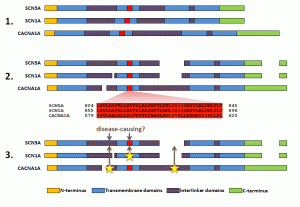As genetic testing of inherited diseases becomes ever more widely used, distinguishing between true disease-causing mutations and innocuous rare genetic variants is a critical issue in clinical genetics. Our new analysis method transfers known clinical mutations between evolutionarily related proteins, or paralogues, allowing us to identify mutations that affect parts of the protein intolerant to variation and therefore likely to be disease causing. Applying this method to two large published studies on genetic heart disease, we have classified over one-third of the novel variants found as pathogenic mutations, variants whose significance would otherwise be uncertain. This method is widely applicable across inherited genetic diseases. (By Dr. Roddy Walsh, http://jmg.bmj.com/content/early/2013/10/17/jmedgenet-2013-101917 )
Paralogue annotation identifies novel pathogenic variants in patients with Brugada syndrome and Catecholaminergic Polymorphic Ventricular Tachycardia
(Visited 155 times, 1 visits today)